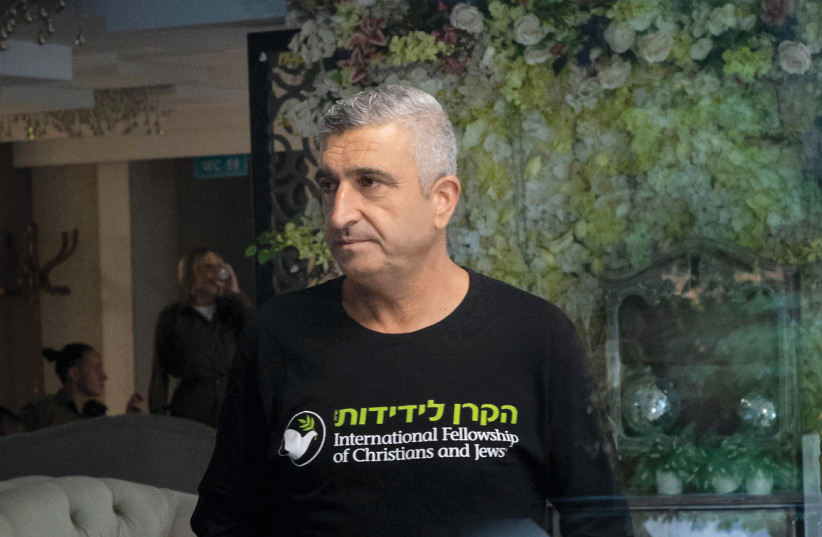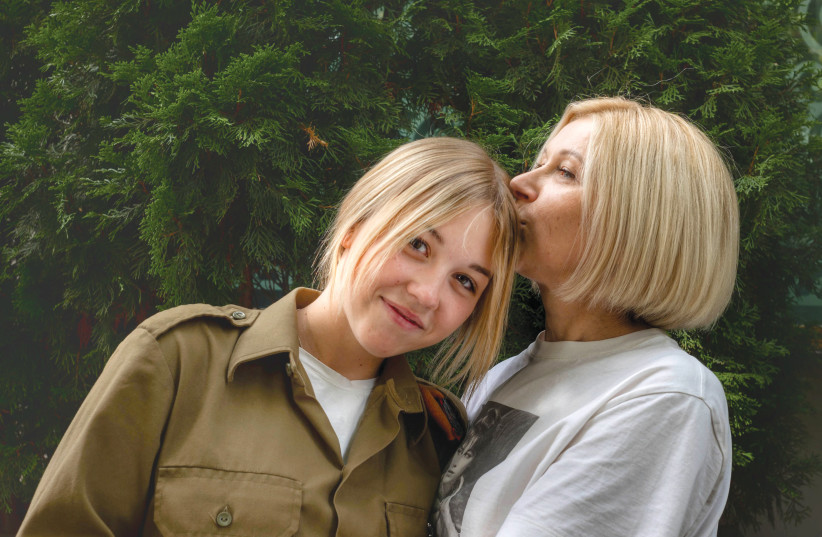A camouflaged 19-year-old named Mark lies down in a rock-strewn field. He positions himself for a dusk-to-dawn rotation. Settling on his stomach, he peers through his rifle’s hi-tech scope toward an Israeli community, focusing on its boundary. There isn’t a visible threat, but he knows that one could appear at any moment, especially under cover of darkness. He cannot move, nod off or sleep. Instead, prone on the ground, he must remain hyper-alert all night long.
Mark is a warrior of Israel, but he was not born there. He is from the war-torn city of Sumi in Ukraine, where his parents live. Twenty miles from the Russian border in northeast Ukraine, Mark’s mother, Victoria, reports that her city is under constant bombardment by Russia’s armed forces.
“I really want to make aliyah (immigrate) to Israel,” she says. “But my husband has a mother who is sick and bedridden. We cannot leave her. The situation is dangerous. Only days ago a school was hit by a missile. There are at least four sirens a day.”
Ukrainians serving as IDF combat troops in Israel meet their families in Moldova
For Mark and other Ukrainians serving as combat soldiers for the IDF, it had been months – for some years – since they last saw their parents. But all that changed the last week of September, when 19 of them met with at least one parent in Chișinău, Moldova’s capital city.
The reunions were poignant, each side concerned for the safety of the other, both quietly aware that their loved one’s well-being could vanish in a flash.

Other countries count mercenaries among their armies. But non-Israelis who join the IDF are not in it for the money. Any among them would chuckle at the notion.
With a slight increase of stipends from Jerusalem, these active duty men and women struggle with cost-of-living issues, IDF service requirements (such as speaking Hebrew), and the IDF’s structural dependence on the families of its soldiers.
The biggest struggle for most lone soldiers, unlike their comrades, is the lack of emotional, practical and material support of a family living in Israel. When their army friends are given leave on weekends to go home, lone soldiers cannot do the same.
There are 7,000 men and women like Mark, who serve in the military separated from their families. Roughly half of these lone soldiers are separated by distance; the other half are either orphans or come from homes from where they receive no support. Some of the soldiers have been outright disowned.
The participation of lone soldiers in the defense of Israel is as old as the Bible. Its numbers include David, Israel’s once and future king. His family, especially his older brothers, emphatically opposed David’s military engagement against Israel’s Philistine enemies and their hero, Goliath. Regardless, he joined the army of Israel. Today, that would qualify him as a lone soldier.
Later, when he became king, his military included an elite division of special forces, colloquially known as David’s Mighty Warriors. Among the 37 who won a place among their ranks, as many as seven were not Jewish or Israeli, including “Uriah the Hittite,” better known today as the husband of Bathsheba with whom David had an affair.
It was 3:30 am on a Monday in September when the plane with 19 of Israel’s lone soldiers landed in Moldova, a country that shares a border with Ukraine on its southwest side.
Almost all the parents arrived by van at about six o’clock that evening. It was an emotional reunion, even for those on the outside who witnessed the hugs and tears through their own blurry eyes.
Because Ukraine does not allow able-bodied men to leave the country – in case they are needed to join battlefields against Russia’s invasion forces – almost all of the parents who came were mothers.
Rafik was an exception. The father of Emil, Rafik was born a Muslim in Azerbaijan. Encouraging his son to move to Israel where his Jewish mother lives, Emil today serves in the elite Sayeret Matkal special forces unit. His father traveled on his own from Odessa, a port city in southwest Ukraine that has been periodically shelled by Russian ships.
Permitted to cross the border because of his disability status, Rafik crossed on foot to the other side, where he boarded a van to Chișinău. Only a few miles later, the van broke down. Determined to see his son, Rafik hailed a taxi and took it the rest of the way to the Aria Hotel in Chișinău.
“My sons are my heritage,” he said upon arrival. “I would do anything to be with Emil, to encourage him.”
While the families were in Moldova, they celebrated an early Rosh Hashanah, visited the Cricova Winery with its 120 kilometers of manufacturing and storage tunnels, and paid tribute to Jews murdered in the Kishinev pogrom of 1903. Kishinev is the city now called Chișinău – except in Hebrew. In that language, it will always be Kishinev.
The soldiers placed a wreath on the monument to Jews murdered in the pogrom, and from there went to the place where virtually all of Moldova’s Jews were placed in a ghetto at the end of WW II and subsequently slaughtered.
The idea for a reunion of lone soldiers with their Ukrainian parents came from Israeli Lt.-Col. (res.) Safwan Mreeh, who lives in the Druze community located on Mount Carmel. While on active duty he commanded a number of lone soldiers, and took to heart the challenges they face.
Continuing to serve in Israel’s reserves, Mreeh also heads Emergency and Security Programs for the International Fellowship of Christians and Jews, also known as The Fellowship.
Smiling, Mreeh says it is also the Fellowship of Christians and Druze.
When he presented the idea of the reunion, it was immediately embraced by the higher-ups in the IFCJ. They underwrote the entire event, flying lone soldiers to Moldova, bringing parents from Ukraine, housing them in Chișinău’s Aria Hotel, organizing the early Rosh Hashanah gala, hosting them on visits in the area, and giving them time to be alone with each other.
“As an immigrant to Israel myself and with the functional life of a husband and children, it was not easy adapting to a new country,” says Yael Eckstein, CEO of The Fellowship. “How hard it must be to be here without the support and backing of family.

“I can’t imagine what these 18- and 19-year-olds are going through, leaving everything they know, all of their security, and coming to Israel. On one hand, they are fulfilling the dreams of their hearts, their souls and their ancestors. On the other hand, they are also leaving behind their loved ones, familiar cultures, native languages, and support networks.
“I can’t imagine what these 18- and 19-year-olds are going through, leaving everything they know, all of their security, and coming to Israel. On one hand, they are fulfilling the dreams of their hearts, their souls and their ancestors. On the other hand, they are also leaving behind their loved ones, familiar cultures, native languages, and support networks.”
Yael Eckstein
“The Fellowship is dedicated to taking on the role of being part of their family, providing a support network, a sense of security, and the knowledge that they are not alone.
“Especially around the holidays, when family normally would be there to give them a big hug, The Fellowship provides them with a nice note and [monetary] gift cards so that they can buy special things for themselves, and also basics they are lacking. We try to continuously let them know that they are not alone, that they are loved and cared for, and that we are here for them. So whether it is providing them with food for the holiday, a mobile snack truck, and sometimes facilitating reunions like the one in Chișinău, The Fellowship is honored to be a family and support network to these holy heroes of Israel.”
During their four days in Moldova, soldiers were openly affectionate with their parents, obviously relishing the time they had to be with them. After three full days, however, it was time to return. The parents headed back to a nation under assault, while their children returned to Israel, where they would step back into roles as defenders of the Jewish state: some by special forces operations inside and outside the borders of Israel, others by guarding the country’s citizens from terror attacks, sometimes openly, many times unseen.
The unsaid reality of their farewells was the ever-present threat to both the parents and the soldiers. Arguably, this is also the reality for all Israelis with sons and daughters in the military.
An Israeli prayer for soldiers
Israelis have a prayer for them, often offered up on Shabbat and special holy days. One English translation of that prayer is this:
May God, who blessed our forefathers Abraham, Isaac and Jacob,
bless the soldiers of the Israel Defense Forces,
who stand guard over our land and the cities of our God,
from the border of Lebanon to the desert of Egypt,
and from the Great Sea to the Aravah,
on land, in air, and on the sea.
May the Lord cause the enemies who rise up against us
to be struck down before them.
May the blessed Holy One preserve and rescue our soldiers
from every trouble and distress and from every plague and illness,
and may God send blessing and success in their every endeavor.
May God cause our enemies to submit before our soldiers
and may God grant them salvation and crown them with victory.
And may there be fulfilled for them the verse,
“For it is the Lord your God
Who goes with you to battle your enemies for you, to save you.”
And let us say, Amen.
All who love the mighty warriors of Israel and the land that they defend, reply:
Amen. Amen. Amen. ■
The writer is an American journalist living in Israel. For more information about lone soldiers and various ways The Fellowship supports them, see https://www.ifcj.org
